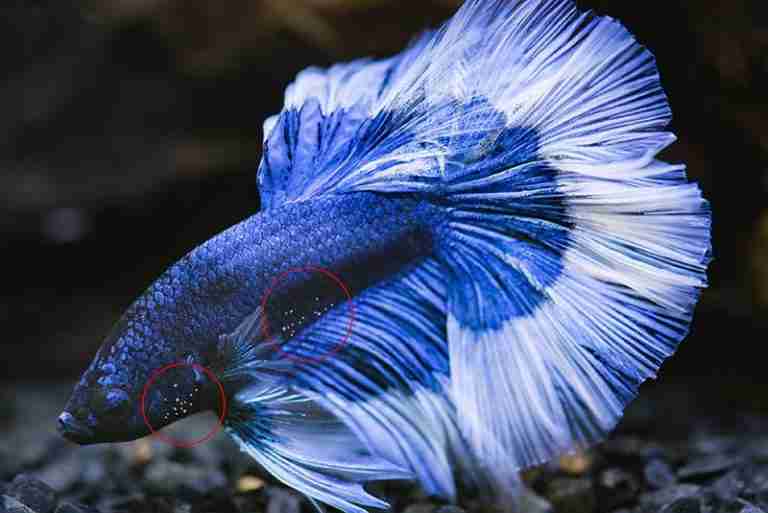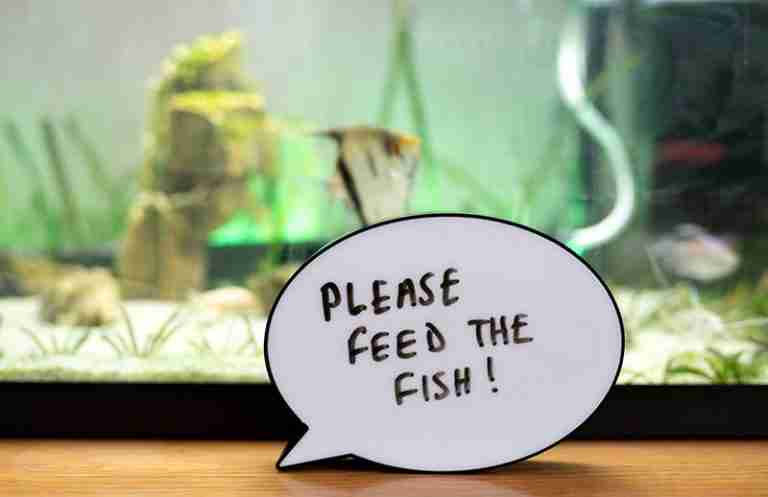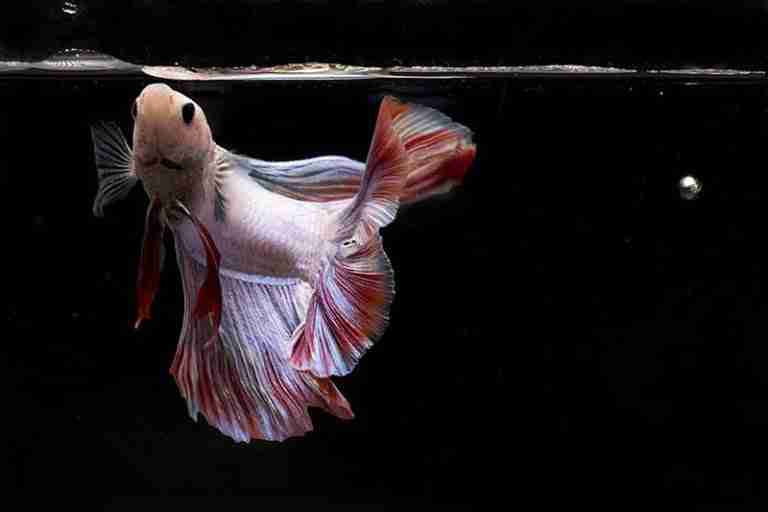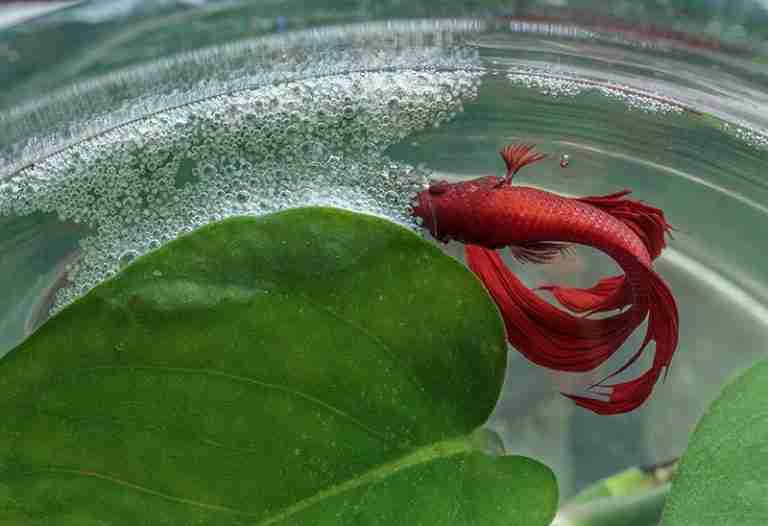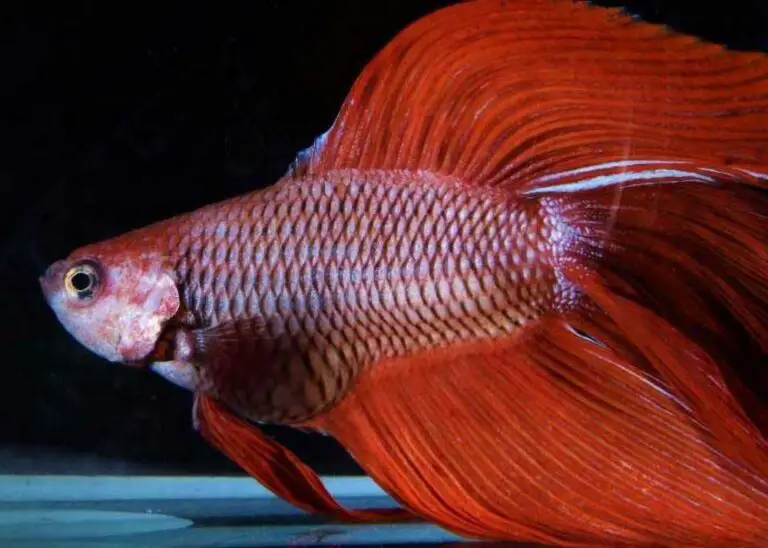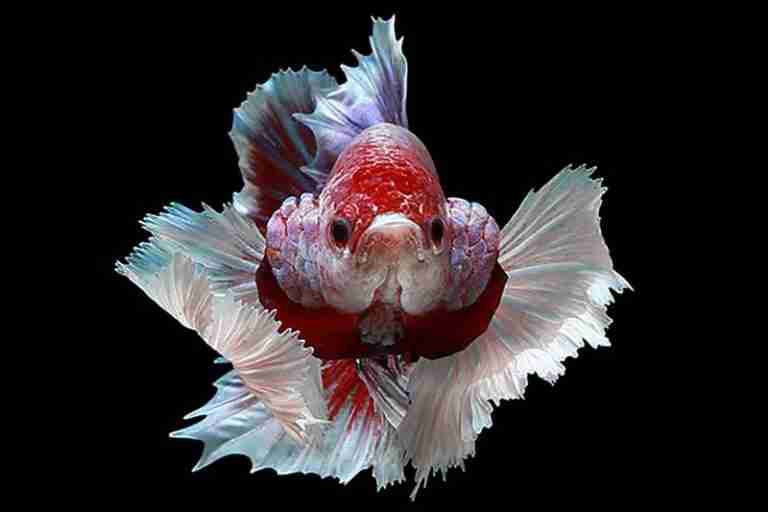How Often To Feed Betta Fish (Example Feeding Charts)
If you keep betta fish or are thinking about getting your first betta fish, there are several things you will need to know so that they can have a healthy and happy life with you. Two essential factors are learning how often to feed betta fish and what to feed them.
Overfeeding betta fish can cause problems with bloating and constipation, and the excess food will usually sit at the bottom of the tank, where it will rot away and cause ammonia spikes to occur in your aquarium water.
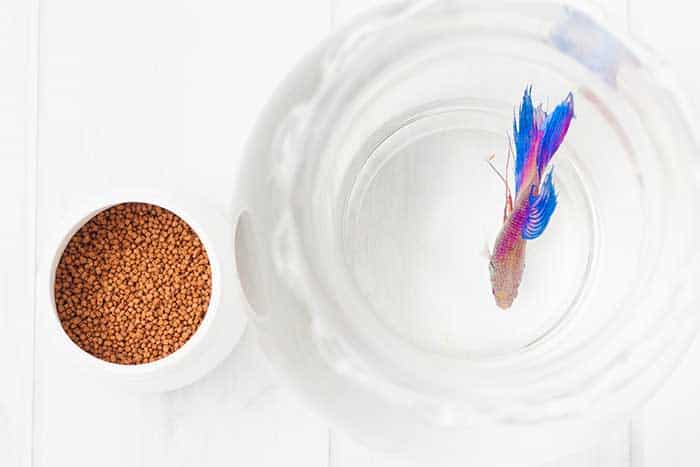
Underfeed your betta, and it will probably get cranky and show signs of stress, which may lead to other illnesses.
Throughout this guide, I will answer the most common questions about how often and how much to feed a betta fish, with some tips on their favorite foods, and finally, some example feeding charts that I use myself.
How Often Should I Feed My Betta Fish
Betta fish typically do best with two meals daily because they have small digestive systems and don’t like to eat big meals. You can feed them once a day, but splitting the daily ration into two meals is best to keep their digestion moving nicely.
Siamese fighting fish can be picky eaters and generally only eat what they need while the food sits at the top of their tank. Betta fish are not bottom feeders; if their food is left uneaten for too long, it will usually sink to the bottom.
What Should You Feed A Betta Fish
Feeding a betta fish correctly is one of the most important ways to maintain good health, so what do betta fish eat? Many people believe that betta fish are carnivores due to their high protein requirements, but they are actually omnivores that are quite happy to eat plant-based foods to supplement their protein-rich diet.
A betta’s diet should consist mainly of protein-rich meaty foods such as brine shrimp, mosquito larvae, bloodworms, and daphnia. These fighter fish foods are all high in protein and will help your betta fish grow and stay healthy.
Betta fish also eat plant-based foods to aid their digestion. Plant-based foods are not a required part of their diet for healthy growth, but they are something wild bettas will eat, so I recommend that you also include them.
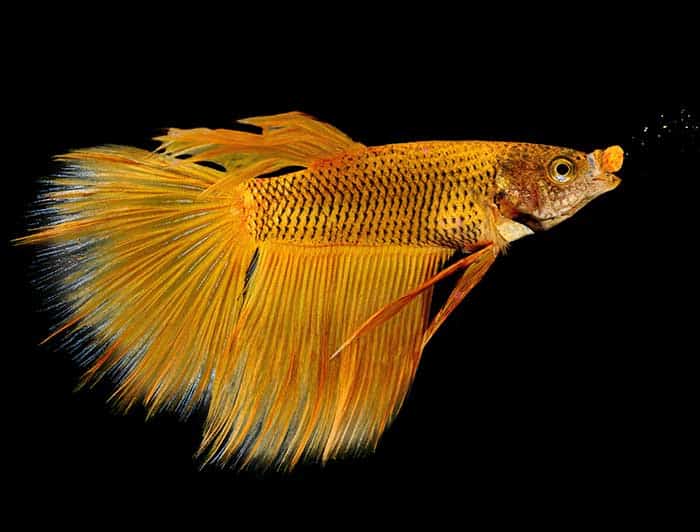
Although live protein-rich foods and a healthy balance of plant-based foods are essential for good health and digestion, betta pellets or flakes are most commonly used as a staple food. Specifically formulated betta pellets and flakes contain essential vitamins, minerals, and proteins that your betta requires.
A betta fish can live purely on betta pellets if necessary, but live and plant-based foods provide the fiber for a healthy digestive system, and betta fish are natural hunters that will get many benefits from chasing live food around the tank.
Important Note
Always remember to soak betta pellets before feeding to help soften them. Pellet food will absorb water and expand, which you will want to avoid happening inside your betta’s stomach, where it may cause a blockage.
What I Use
- Freeze-dried bloodworms (Find The Best Price)
- Freeze-dried brine shrimp (Find The Best Price)
- Daphnia (Check Price Of Live Daphnia On Amazon)
- Mosquito larvae (no more than one per week) – (Find The Best Price)
General Food Supplies On Amazon & Chewy
How Often Should You Feed A Betta Fish Bloodworms Or Other Live Foods
Betta fish can eat bloodworms every day if you wish, but I would recommend every other day as a treat. Bloodworms are high in protein and fat, which is unsuitable for a betta’s health if given too often. The same is true for Brine shrimp and Mysis shrimp, so they should be given on alternate days to pellets.
Daphnia can be given daily as it is low in protein and fat. Daphnia is also very small, so a betta will only eat a few at a time. Daphnia is also great for reducing bloating and constipation.
It would be best to provide your betta will specialized betta pellets that contain added vitamins and minerals specific to your betta’s requirements and provide live, frozen, or freeze-dried foods about three times a week.
Can You Overfeed Betta Fish
If you feed your betta fish too often, one of the most common issues you will face is overfeeding them. Although it’s better to feed your betta fish two or three times a day rather than one large meal, this makes each meal appear quite small, and often, extra is added.
The best way to avoid overfeeding is to divide a single meal into two or three potions and put each into a feeding pot, which will ensure you stick rigidly to the correct quantity.
Overfeeding a betta fish can lead to several problems, such as weight gain over time, or your betta may experience sudden bloating or constipation. All of these issues can affect a betta’s health, and bloat or constipation can lead to complications such as swim bladder disorder which will interfere with buoyancy.
Fasting is a common and healthy practice that suits most fish species, and it involves withholding food for one or two days per week, allowing your fish to clear their stomach and bowels completely. I fast all my fish on weekends, and they often find scraps of food lying around the tank.
Betta Fish Feeding Chart
There is no set requirement for feeding betta fish. In the wild, betta fish eat what they can get and when they can get it, but during their time in captivity, betta owners have refined their diets to give them the best health and improve their betta fish’s lifespan.
The two feeding charts below will give you an idea of how best to feed your betta fish throughout the week, but feel free to experiment and decide upon your own feeding schedule based on your betta’s requirements. A varied feeding routine will stop your betta from getting bored with its food.
Example 1 Betta Feeding Chart
| Week Day | Food Type |
|---|---|
| Monday | Betta Pellets (9 AM) Betta Pellets (6 PM) |
| Tuesday | Betta Pellets (9 AM) Brine Shrimp (6 PM) |
| Wednesday | Betta Pellets (9 AM) Betta Pellets (6 PM) |
| Thursday | Betta Pellets (9 AM) Blood Worms (6 PM) |
| Friday | Betta Pellets (9 AM) Betta Pellets (6 PM) |
| Saturday | Betta Pellets (9 AM) Brine Shrimp (6 PM) |
| Sunday | Fasting Day (No Food) |
Example 2 Betta Feeding Chart
| Week Day | Food Type |
|---|---|
| Monday | Tubifex Worms (10 AM) Betta Pellets (8 PM) |
| Tuesday | Betta Pellets (10 AM) Brine Shrimp (8 PM) |
| Wednesday | Betta Pellets (10 AM) Betta Pellets (8 PM) |
| Thursday | Betta Pellets (10 AM) Betta Pellets (8 PM) |
| Friday | Blood Worms (10 AM) Betta Pellets (8 PM) |
| Saturday | Betta Pellets (10 AM) Mysis Shrimp (8 PM) |
| Sunday | Fasting Day (No Food) |
As you can see from the examples, there is no set feeding time or food type. Routine is key when it comes to feeding times, you do not need to keep feeds 12 hours apart. I wouldn’t recommend giving Tubifex Worms and Blood Worms on consecutive days, nor would I give Brine Shrimp and Mysis Shrimp on consecutive days.
You do not have to include a fasting day, but if your betta suffers from constipation, you should definitely consider it. Fasting for one or two days a week is good practice for most fish as it gives the digestive system time to rest. Your betta won’t go hungry as they will scour the tank for left-over food and will eat snails or other pests.
Lastly, if you only have Brine Shrimp or Blood Worms, it will be fine. Just consider changing it up if your betta loses interest.
How Often Do You Feed Baby Betta Fish
You should feed baby betta fish fry small amounts of a suitable food source 4-5 times per day until 5-6 months of age. Feed them live baby brine shrimp as they are full of nutrients and can be added to the tank as a constant food source to be eaten when your betta fry is hungry.
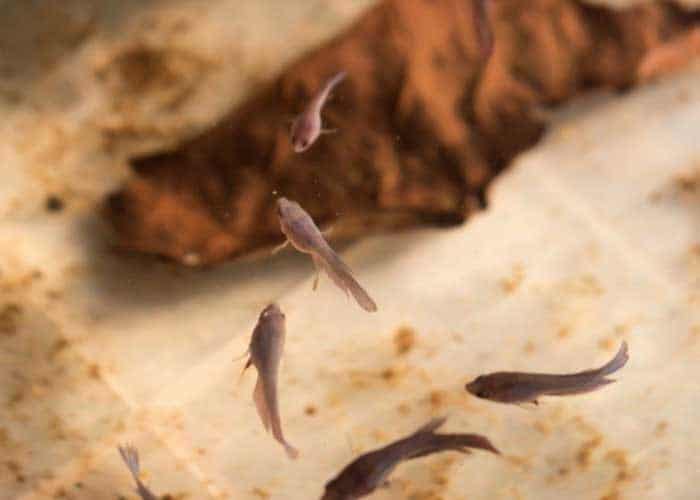
Brine shrimp breed quickly, so you can set up a small breeding tank and have a ready-made food source for your betta fry. You can feed frozen or freeze-dried baby brine shrimp to your betta fry or buy a commercial brand of baby betta food. Neither will be as nutrient-rich, and if you add too much to your betta’s tank, it will quickly rot and upset your aquarium water parameters, unlike live food.
How Much Do You Feed Baby Betta Fish
If you are using live food, you can add enough to your baby bettas tank, so a consistent food source is available. Your baby bettas will only eat when they are hungry. If you are using frozen or freeze-dried food, you should only add a small pinch that will not go uneaten 4-5 times per day.
When betta fish are in the early stages of life, they will only need a tiny amount of food to fill their extra small stomachs, but as they grow, you can increase the amount you feed them. Just take note of how much food sinks and goes uneaten, as it will release ammonia into the tank as it rots.
If you have baby betta fish and want a complete guide on how to care for them (including feeding tips), you can read an article I wrote on baby betta fish.
Wrap Up
I hope this betta fish feeding guide has given you a better understanding of the food types best suited to betta splendens. Most tropical fish owners will typically feed only flakes of pellets, which is fine in most community tanks with a variety of fish, whereas a betta’s diet will certainly benefit from some live or frozen food.
Keeping healthy fish and avoiding serious health problems is your priority as an aquarist. Understanding how often to feed betta fish, and knowing the best food types with the highest nutritional benefits, will provide your betta with a healthy diet, aiding in good growth and a healthy life.


